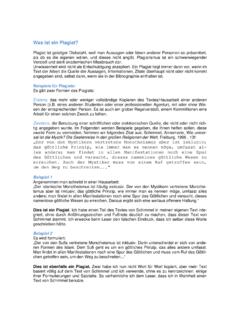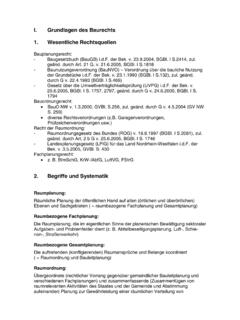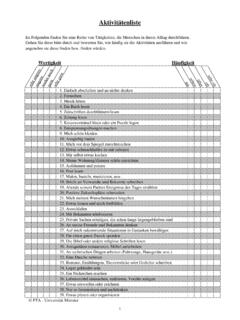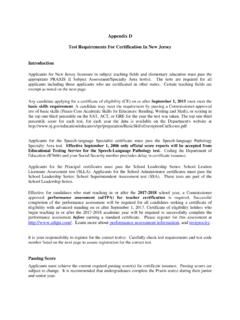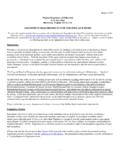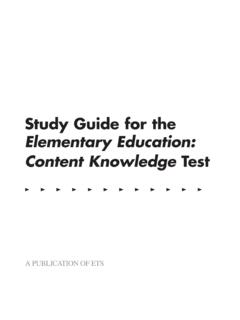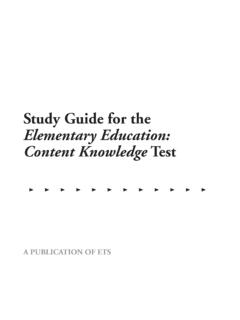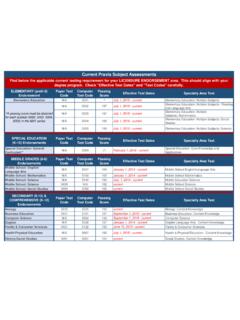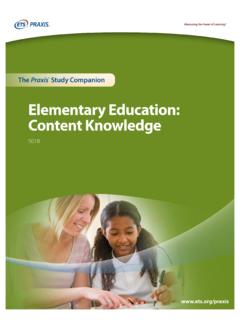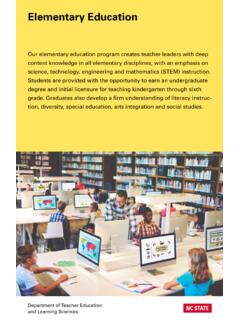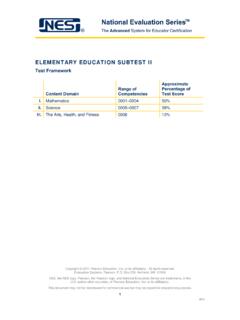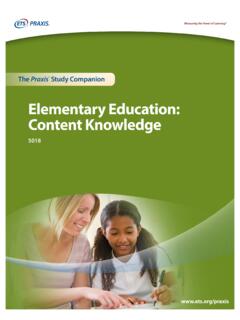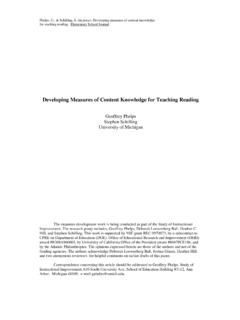Transcription of ELEMENTARY TEACHERS’ PEDAGOGICAL CONTENT …
1 ELEMENTARYTEACHERS PEDAGOGICALCONTENTKNOWLEDGEANDSTUDENTACH IEVEMENTIN SCIENCEEDUCATIONKimLange1,ThiloKleickman n2andKorneliaM ller11 UniversityofMuenster,Germany2 LeibnizInstituteforScienceandMathematics education ,Kiel,GermanyAbstract:Thescopeo fthispaperistoexplorewhetherelementarysc ienceteachers pedagogicalcontentknowledge(PCK)inthecon tentarea statesofmatterandchangesofstate contributestogainsinelementarystudents theGermanResearchFoundation(project PLUS ).Teachers PCKforstudents progressin PCKwassignificantlyrelatedto studentachievementinelementaryscienceaft er :teachers,pedagogicalcontentknowledge,st udentoutcomes,scienceeducation,hierarchi calmodelingINTRODUCTIONI ntheresearchliteratureonteachingandteach ereducation,thereisasharedunderstandingt hatteachers professionalknowledgeisanimportantdeterm inantofinstructionalquality thatimpactsstudents achievementgains(Baumert&Kunter,2006;Bro mme,1997;Munby,Russell,&Martin,2001).
2 Yetfewempiricalstudieshaveassessedthedif ferentcomponentsofteachers pedagogicalcontentknowledgeasacrucialcom ponentofteachers professionalknowledgemakesa contributiontoexplainingdifferencesinstu dents ispartof theprojectPLUS(Teachers professionalknowledge,scienceteachingand studentoutcomesin thetransitionfromprimaryto secondaryschool) ,whichhadtwomeasurementpoints,surveyeda elementarysample,thestudyathandexploredw hetherteachers pedagogicalcontentknowledge insciencecontributestogainsinstudents , professionalknowledgewaslaidattheAmerica nEducationalResearchAssociationmeetingin 1985,whenLeeShulmanproposedamodelforconc eptualizingknowledgefor , specifiedthesedomainsof teacherknowledgeoverthelastdecades,these threecomponentshaveconsistentlyappearedi nliteratureandthusseemtobeinternationall yagreeduponascorecomponentsofteachers professionalknowledge(Baumert&Kunter,200 6;Borko&Putnam,1996;Bromme,1997;Munby,Ru ssell,&Martin,2001).
3 Knowledgeofgenericpedagogy(PK) isdescribedasgeneral,subject-independent knowledgeaboutclassroomorganization andmanagement, (CK)includestheknowledgeofa ,concepts,principlesandtheoriestoalsoinc ludeanunderstandingofhowconceptsandprinc iplesofasubjectareorganizedandtherulesof evidenceandproofthatareusedtojustifyclai msina classificationof teachers knowledge ,pedagogicalcontentknowledge(PC K)isconsideredthecentralcomponentofteach ers professionalknowledgethatdistinguisheste achersfromsubjectmatterspecialists(Gross man,1990;Shulman,1987;VanDriel,Verloop,& DeVos,1998).PCKisdefinedasakindof amalgam ofcontentknowledgewithpedagogicalandpsyc hologicalknowledgeaswell aswiththeteachers personalexperiences,creatinganunderstand ingofhowcertaintopics,problemsorissuesou ghttobepresentedandadaptedtothelearners differentinterestsand abilities(Shulman,1987).
4 Magnusson,KrajcikandBorko(1999)proposeda modelofPCKintheareaofscienceeducation, orientationstowardsscienceteaching , knowledgeof sciencecurricula , knowledgeofstudents understandingof science , knowledgeof instructionalstrategies and knowledgeofassessmentforscience .RecentstudiesonthedifferentdomainsofPCK ( ,knowledgeof students understandingorinstructionalstrategies)i nmathematicsfoundthatteachers mathematicalPCKwaspositivelyrelatedtostu dents gainsinmathematicalachievement( ,2002;Hill,Rowan,&Ball,2005,Baumertetal. ,2010).Whereasstudiesinthedomainoforient ationstowardsteachinghavealreadybeenesta blishedinthefieldofelementaryscience(Kle ickmann,2008),studiestargetingat ,thisstudyaimsatmeasuringelementaryscien ceteachers PCKdirectly,followedby examiningitsrelevanceforstudents (621girlsand702boys,3studentsdidnotindic ategender)in60classrooms,thedatapresente dherestemsfromaprojectinvestigatingthede velopmentandinterplayofscienceinstructio n,classroomclimateandstudents scienceinterestinthetransitionfromprimar ytosecondaryeducationinGermany(PLUSS tudy).
5 Statesofmatterandchangesofstate bothbefore statesofmatter .Theassessmentofteachers (1999).Consideringtherecentstudiesinmath ematicsthatdescribed knowledgeofstudents understanding (KSU)and knowledgeofinstructionalstrategies (KIS)ascomponentsofPCK thattriggerstudents achievement,thefocusof conceptionsaspossibleconcerninganevery-d ayevaporationsituation(KSU).Otheritemspr esentedsituationsinwhichteachersareasked todetectcomprehensiondifficultiesor todescribeadequatebehaviortopromoteinsig htfulstudentlearning(KIS).Thefinaltestco nsistedof14items(11free-response-,3multi ple-choice-items)andshowedgoodpsychometr icalqualities(averageICC=.92,range:. ;Cronbachs = ).Studentachievementwasassessedattheendo ftheunitby atestcoveringcondensationandevaporationa swellastheliquidandgaseousstateofmatter( usingwaterasexample).
6 Thereliabilityofthefull test(24itemsinmultiple-choice-ormultiple -select-format)wasCronbachs =.67inthepretestandCronbachs =. elementaryscienceteachers PCKonstudents ,wecontrolledforrelevantstudentcharacter isticlikepriorknowledge,generalcognitive abilities,Germanasnativelanguage,socio-e conomicbackgroundandgenderaswellasforcri ticalclassroomandteachercharacteristicsl ikedurationofinstruction, the softwareMplus,whichestimatesthemissingva lues(Muth n&Muth n,1998-2009).RESULTSI nafirststep,thevarianceinstudents thevariablesattheindividuallevel, , students topic-specificpriorknowledge atthebeginningoftheunit, ,Germanasnativelanguage, , :durationof instruction,qualityof learningachievementconcerning statesofmatter elementaryscienceteacherswasenteredinthe modelnexttothecontrolvariablestheresults revealedasubstantialpositiveeffectofthem easuredPCKonstudents gainsinscienceachievementinthedomainof statesofmatter.
7 Thirteenpercentofthevarianceinachievemen tbetweenclasseswasexplainedby PCKaftercontrollingforkeystudent-andteac her-levelcovariates(fordetailedanalysess eeLange,Kleickmann,Tr bst,&M ller,inprint).DISCUSSIONANDCONCLUSIONI nthepresentedstudyweconstructedandimplem enteda testto assessprimaryteachers succeededindevelopingareliableandvalidte stwhichwasneededtoanswerourresearchquest ionsontheimpactof PCKonstudents achievementgainsin ,wewereabletoshowthatelementarysciencete achers PCKpositivelypredictsstudents gainsinscienceachievementinthedomainof statesofmatter .Theseresultsarenicelyinlinewithfindings oneffectsofdomain-specificknowledgeinthe fieldofmathematics(Baumertetal.,2010,Hil letal.,2005). teachers PCKonstudents learninggainsoverawholeschoolyear,ourstu dy ,weinvestigatedtheimpactofteachers ,thequestionwhetherthesmalleffectsizeisa domain-specificeffectornot, ,onecouldtentativelyconcludethatitmightb epossibletoimprovestudents ,J.
8 ,&Kunter,M.(2006).Stichwort:Professionel leKompetenzvonLehrkr ften[Keyword:Professionalcompetenciesoft eachers].Zeitschriftf rErziehungswissenschaft(9), ,J.,Kunter,M.,Blum,W.,Brunner,M.,Voss,T. ,Jordan,A.,et al.(2010).Teachers'mathematicalknowledge ,cognitiveactivationin the classroom, ,47(1), ,H.,&Putnam, (1996). (Eds.),Handbookofeducationalpsychology( ). ,R.(1997).Kompetenzen,Funktionenundunter richtlichesHandelndesLehrers[Teachers'co mpetencies,functionsandactioninclass]. (Ed.),Enzyklop diederPsychologie:PsychologiedesUnterric htsundderSchule( , ).G ,R.(1997).Kompetenzen,Funktionenundunter richtlichesHandelndesLehrers[Competencie s,functionsandinstructionofteachers]. (Hrsg.),PsychologiedesUnterrichtsundderS chule( ).G , (1990).
9 :TeachersCollegePress, , ,Rowan,B.,&Ball,D.(2005).Effectsofteache rs' ,42(2),371 (2008).Zusammenh ngefachspezifischerVorstellungenvonGrund schul-lehrkr ftenzumLehrenundLernenmitFortschrittenvo nSch lerinnenundSch lernimkonzeptuellenVerst ndnis[Relationsofteachers'conceptionsoft eachingandlearningsciencewithstudents'pr ogressinunderstandingofscientificconcept s].M ,K.,Kleickmann,T.,Tr bst,S.,&M ller,K.(inprint).FachdidaktischesWissenv onLehrkr ftenundmultipleZieleimnaturwissenschaftl ichenSachunterricht[Teachers pedagogicalcontentknowledgeandmultiplele arningoutcomein elementaryscience].Zeitschriftf ,S.,Krajcik,J.,&Borko,H.(1999).Nature,so urces, (Eds.), ( , ).Munby,H.,Russell,T.,&Martin, (2001).Teachers' (Ed.),Handbookofresearchonteaching(fourt hed.)
10 , ). n, ,&Muth n, (1998-2009).Mplusstatisticalanalysiswith latentvariables:User'sguide(5ed.).LosAng eles,CA:Muth n&Muth , ,P.(2001). (Ed.),HandbookofResearchonTeaching( ).Shulman, (1987). ,57(1), ,L.(1986). ,15(2),4 ,& (2002).Thenatureofteachers pedagogicalcontentbeliefsmattersforstude nts ,93,344 , ,Verloop,N.,&DeVos,W.(1998).Developingsc ienceteachers' ,35(6),673-695.


